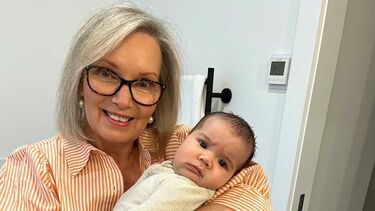
Menopause took Julieann by surprise. Her life was busy. And health was never a priority for this working mother. But there was a voice inside telling her that something wasn’t quite right. She’s terribly glad now that she listened to it.
Even now, nearly a decade after she underwent open heart surgery, Julieann Scott still cannot decide which came first – her menopause or her heart issues. “I suppose they were two separate issues happening at the same time,” she says.
Like many working mothers, she was juggling. A full-time job. Four teenage children. A husband who often worked away. Julieann’s health was not a priority. “Women always put a lot of other things before ourselves,” she says. “I probably had a high pain threshold and pushed through a lot of stuff.”
She first noticed some symptoms when she was in her 40s. She had left her job in banking for a less stressful one in retail and was surprised by how physical it was, leaving her breathless a lot of the time. A colleague asked if she might be going through menopause.
“Our mind isn’t ready for it, but our bodies are telling us something different,” she says. “I felt I had no energy, and it was beyond the normal tired.” A doctor confirmed she was in menopause. She tried some natural remedies to cope with the hot flushes and insomnia.
“I bought this sort of natural oestrogen which was supposed to help if it was applied to different places,” she recalls. “It cost a lot of money and did absolutely zero … I also got sprays for menopause – whatever the market was offering – because I felt so drained.”
Eventually she was offered menopausal hormone treatment (MHT). “A lot of women are scared to go on MHT, me included, because I don’t like taking pills, but I certainly felt that it made things more manageable.”
But the tiredness persisted.
“I remember going to the shops one day with my husband and the further I walked, the slower I got. He said it was like shopping with his mum!”
Upon seeing a new GP, Julieann was swiftly referred to a cardiologist (heart specialist) who found that an important valve in her heart had narrowed. This was reducing blood flow to the rest of her body, explaining her symptoms of fatigue and breathlessness. If untreated, this condition – known as aortic stenosis – can lead to death.
“I was shocked,” says Julieann. “Back then, men had heart attacks. So did big drinkers and big smokers. I didn’t fit the profile ... I looked perfectly healthy and didn’t fit any of the criteria for heart issues – or so I thought.”
“Back then, men had heart attacks. So did big drinkers and big smokers. I didn’t fit the profile ... I looked perfectly healthy and didn’t fit any of the criteria for heart issues – or so I thought.”
Heart valves are important parts of your heart. They act like doors, opening and closing to allow blood to flow through. One of the first signs of heart valve disease is often a heart murmur – when your heartbeat sounds different to the norm – something Julieann learned she had during her first pregnancy.
Unfortunately, heart valve disease was not Julieann’s only heart issue. “I do remember telling the cardiologist that I kept getting an ache in my left arm which woke me up at night.
“He said that it had nothing to do with my [aortic] valve. I had a blockage in one of my coronary arteries [which supply blood to the heart muscle] and I needed a bypass.” This procedure creates a new path for blood to flow, bypassing the blocked artery.
In the decade since her open-heart surgery, Julieann, 62, has a greater appreciation of her life and her health. “I think we deal with so much as women and we can be quite harsh on ourselves,” she says.
“But I think women need to have a bit of self-love and to put themselves first ... I had been told that but didn’t take heed until I went through what I did.”
“But I think women need to have a bit of self-love and to put themselves first ... I had been told that but didn’t take heed until I went through what I did.”
Cardiovascular disease, including heart disease and stroke, is the biggest killer of women in Australia.
Before menopause, the hormone oestrogen helps to protect our cardiovascular health. But when oestrogen levels decrease, as they do in menopause, our risk of heart disease rises.
Changing hormones are one of the reasons why heart health needs to be on the radar of all women after menopause. This means getting regular heart health checks and living a heart-healthy life, such as eating well, keeping active, avoiding smoking and minimising alcohol intake.
And remember, if something isn’t feeling quite right, don’t just shrug it off. Talk to your doctor.

Get to know the wide-ranging symptoms of perimenopause and menopause, with our menopause symptom checklist.
All reasonable steps have been taken to ensure the information created by Jean Hailes Foundation, and published on this website is accurate as at the time of its creation.
© 2025 Jean Hailes Foundation. All rights reserved. This publication may not be reproduced in whole or in part by any means without written permission of the copyright owner. Contact: licensing@jeanhailes.org.au